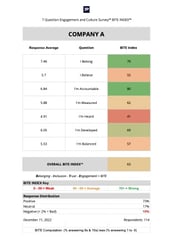The 7Q7P Framework is partially built on the presumption that employee buy-in needs to occur on an ongoing basis. Having a single discussion with your workers and having them agree that they belong in your organization is a great start, but things are never static in business, and all of the elements that drive the business forward are constantly changing. In addition to that, the features of your employees’ private lives will also fluctuate as time marches on.
Ultimately, this means the environment in which your employee was once able to answer “yes” to each of the 7 Questions may no longer exist, and the answer of your employees to each of those questions may change along with the type of work they’re asked to do, or with the changes that have occurred in their private lives.
From a numerical standpoint, 90 days makes perfect sense as a natural business cycle. Ninety days is roughly one quarter of a year, and the four seasons of the year are each allocated around 90 days. Human beings are naturally attuned to a seasonal calendar, as they have been dealing with seasonal shifts and changes for as long as they have been present on Earth. Therefore, 90 days is a logical chunk of time for checking in with your employees and making sure they are still locked in.
Moreover, whether it is due to a seasonal predisposition people have, or because of some other reason, the performance levels of human beings have a natural tendency to “go off the rails” after 90 days, as my friend Gino Wickman - the creator of the EOS operating system - accurately pointed out to me. This makes 90 days an ideal interval between seasonal conversations with your employees. It grants you a scheduled opportunity to make sure they are still aligned with your company, to diagnose any problems they might be having with retaining their focus, and to once again get them locked in on accomplishing the goals connected with every position they fill for your organization.
Another factor to consider is the seasonality of your business itself. The concerns and priorities of different businesses fluctuate naturally over the course of a year. Whether or not a specific product line or service is provided by your organization is often seasonally dependent. This is taken to its extreme within the clothing industry, where the creation and sale of garments is managed entirely through a seasonal lens, and with seasonal considerations in mind.
Because business objectives are prone to change, either through the natural course of operations, or through predictable shifts that take place year after year, a 90-day conversation is also a tremendous tool for reassuring yourself that your employees are capable of performing the responsibilities that are expected of them as changes loom.
If you feel that an employee’s skill set comes up short, you can use the seasonal conversation as an opportunity to diagnose the problem and prescribe a remedy. Remedies include options like assigning mentors to your employees to help them develop the skills needed for them to feel comfortable and confident in executing their responsibilities or placing your workers on new teams that maximize their strengths while partnering them with teammates who can help them to overcome their weaknesses and convert them into strengths over time.
The crux of the matter is the efficacy of the 90-day business cycle is supported by both natural and anecdotal evidence. In light of this, it is advantageous for your employees to have a 90-day check-in session with you to make sure they are comfortable with the way things are going, to make sure they feel they are being measured fairly, and to make sure they know you have their best interests in mind as you present your strategy for developing them.
Trust me: Your employees will be glad to know that you care about their development and progression, and they will reward you by aligning with your vision and elevating their job performances to new levels of greatness.





